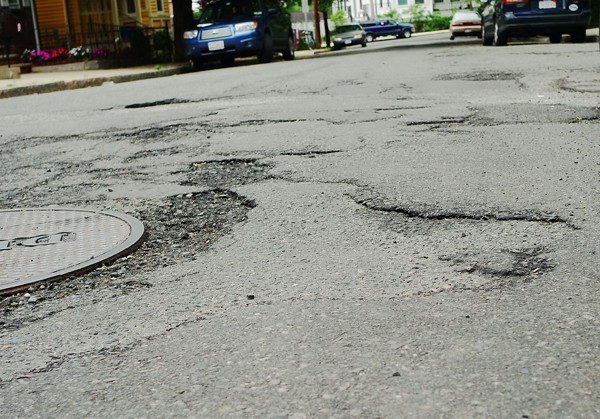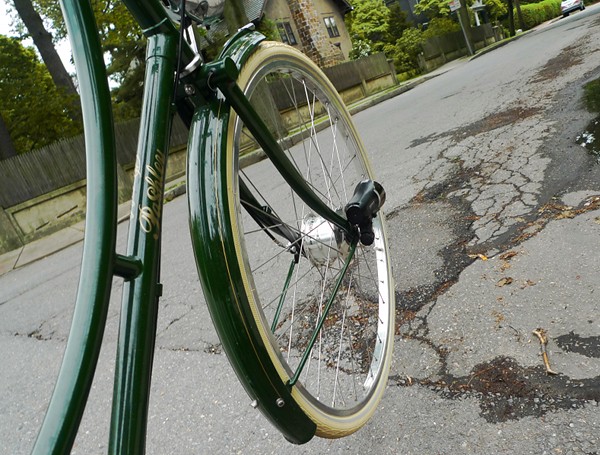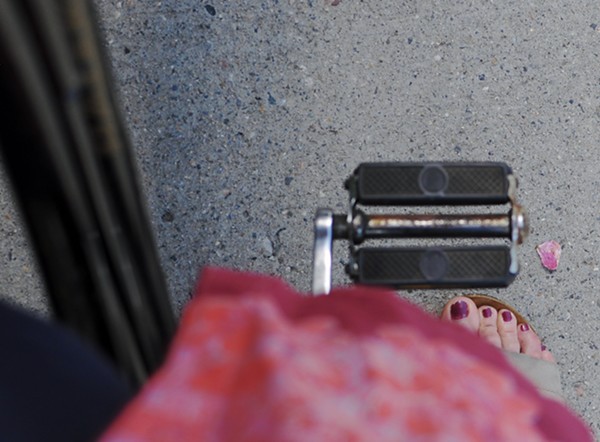
The other day I was cycling on a busy road where the city has recently installed those raised-platform intersections to make the cars slow down before crosswalks. Ahead of me, I saw a cyclist brake just as she entered the intersection - probably hoping to reduce the impact of the bump. Watching her, I somehow knew what was going to happen next and winced. And then it happened: As her wheel hit the raised platform, her bicycle flipped over, and she with it. All this occurred at a slow enough speed, so that she wasn't hurt and was soon back on the bike. But I suspect that she has no idea why the fall happened, which means that it might happen to her again.

To me, it has always seemed self-evident that it is "bad" to brake while going over bumps, and watching the cyclist's fall confirmed that. But were there actually any facts behind this belief? I got home and looked it up, stumbling upon
Sheldon Brown's explanation.
Bumpy surfaces. On rough surfaces, your wheels may actually bounce up into the air. If there is a chance of this, don't use the front brake. If you apply the front brake while the wheel is airborne, it will stop, and coming down on a stopped front wheel is a Very Bad Thing.
Okay, that makes sense. It has also since been pointed out to me that braking transfers the weight of the bicycle forward, so braking on the bump drives the front wheel right into it. Makes sense as well. So, we essentially have two forces working against us when braking over a bump.

When we find ourselves hurdling towards an obstacle n the road that we cannot avoid, naturally the reflex is to slow down. But this should be done
before going over the said obstacle, not during. Braking is your friend, but only when done correctly (brake before the bump, then release before going over it). I would also venture to say that most casual cyclists who use handbrakes do not differentiate between front and rear.

Of course, this is just one more reason why I love coaster brakes for cycling in the city. If you're used to braking with a coaster brake in order to slow down, you do not rely on the front brake as much and are not likely to squeeze it while going over a bump. I know that some will not agree with me on that one, but that is how I see it, and the coaster brake has been a reliable ally for me in pothole-ridden Boston Metro.
 The other day I was cycling on a busy road where the city has recently installed those raised-platform intersections to make the cars slow down before crosswalks. Ahead of me, I saw a cyclist brake just as she entered the intersection - probably hoping to reduce the impact of the bump. Watching her, I somehow knew what was going to happen next and winced. And then it happened: As her wheel hit the raised platform, her bicycle flipped over, and she with it. All this occurred at a slow enough speed, so that she wasn't hurt and was soon back on the bike. But I suspect that she has no idea why the fall happened, which means that it might happen to her again.
The other day I was cycling on a busy road where the city has recently installed those raised-platform intersections to make the cars slow down before crosswalks. Ahead of me, I saw a cyclist brake just as she entered the intersection - probably hoping to reduce the impact of the bump. Watching her, I somehow knew what was going to happen next and winced. And then it happened: As her wheel hit the raised platform, her bicycle flipped over, and she with it. All this occurred at a slow enough speed, so that she wasn't hurt and was soon back on the bike. But I suspect that she has no idea why the fall happened, which means that it might happen to her again. To me, it has always seemed self-evident that it is "bad" to brake while going over bumps, and watching the cyclist's fall confirmed that. But were there actually any facts behind this belief? I got home and looked it up, stumbling upon Sheldon Brown's explanation.
To me, it has always seemed self-evident that it is "bad" to brake while going over bumps, and watching the cyclist's fall confirmed that. But were there actually any facts behind this belief? I got home and looked it up, stumbling upon Sheldon Brown's explanation. When we find ourselves hurdling towards an obstacle n the road that we cannot avoid, naturally the reflex is to slow down. But this should be done before going over the said obstacle, not during. Braking is your friend, but only when done correctly (brake before the bump, then release before going over it). I would also venture to say that most casual cyclists who use handbrakes do not differentiate between front and rear.
When we find ourselves hurdling towards an obstacle n the road that we cannot avoid, naturally the reflex is to slow down. But this should be done before going over the said obstacle, not during. Braking is your friend, but only when done correctly (brake before the bump, then release before going over it). I would also venture to say that most casual cyclists who use handbrakes do not differentiate between front and rear. Of course, this is just one more reason why I love coaster brakes for cycling in the city. If you're used to braking with a coaster brake in order to slow down, you do not rely on the front brake as much and are not likely to squeeze it while going over a bump. I know that some will not agree with me on that one, but that is how I see it, and the coaster brake has been a reliable ally for me in pothole-ridden Boston Metro.
Of course, this is just one more reason why I love coaster brakes for cycling in the city. If you're used to braking with a coaster brake in order to slow down, you do not rely on the front brake as much and are not likely to squeeze it while going over a bump. I know that some will not agree with me on that one, but that is how I see it, and the coaster brake has been a reliable ally for me in pothole-ridden Boston Metro.







.jpg)







0 comments:
Post a Comment